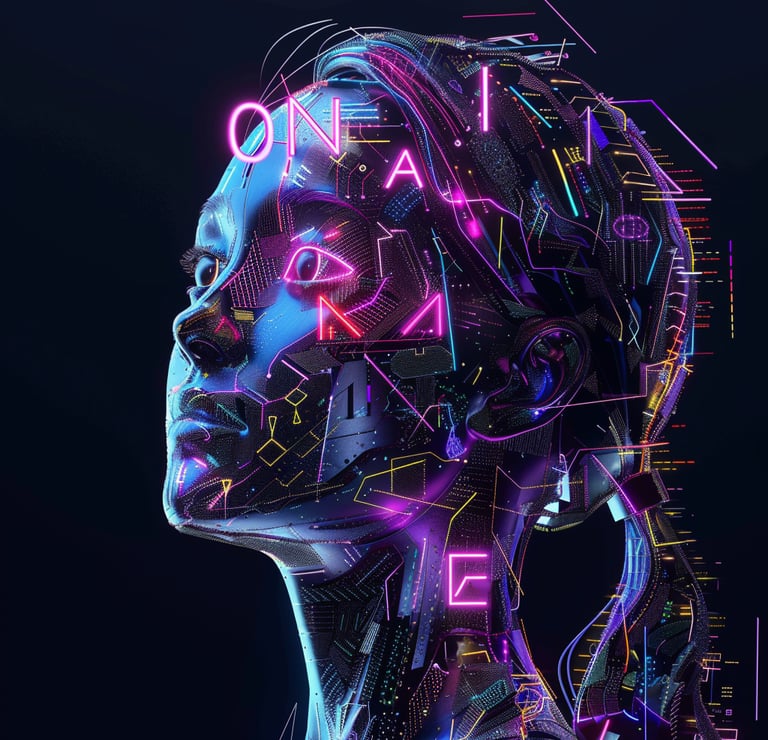
How to Leverage AI for Personalized Digital Marketing Campaigns
Learn how to harness the power of artificial intelligence (AI) to create personalized digital marketing campaigns that drive results. Discover cutting-edge strategies and tools that can help you reach your target audience with precision and efficiency. Stay ahead of the competition by leveraging AI for your marketing efforts.
ARTIFICIAL INTELLIGENCE DIGITAL MARKETING
Bashaar Ahmed
3/4/20248 min read
Introduction to AI in Digital Marketing
Artificial Intelligence (AI) in digital marketing has revolutionized the way businesses engage with their target audience. By leveraging the power of AI technologies, marketers can now analyze vast amounts of data to gain valuable insights into consumer behavior and preferences. This enables them to create highly personalized and targeted campaigns that drive better results and improve ROI. Brands such as Starbucks have successfully implemented AI in their marketing strategies, using predictive analytics to anticipate customer needs and deliver more relevant content and offers.
In today's competitive landscape, understanding the role of AI in digital marketing is crucial for staying ahead of the curve. AI has the potential to streamline processes, automate repetitive tasks, and enhance customer experiences like never before. Companies like Amazon utilize AI algorithms to provide personalized product recommendations based on past behaviors, driving increased sales and customer satisfaction. As organizations continue to adopt AI technologies in their marketing efforts, those who embrace this digital transformation will undoubtedly gain a competitive edge in the market.


Understanding AI's Role in Modern Marketing
AI has revolutionized the landscape of modern marketing by enhancing the effectiveness of personalized marketing campaigns. Through advanced algorithms and machine learning capabilities, AI enables marketers to analyze vast amounts of customer data to segment audiences based on behavior, preferences, and demographics. This deeper understanding of consumer insights allows for the creation of tailored and targeted campaigns that resonate with individual customers on a more personal level, ultimately driving higher engagement and conversion rates.
With AI playing a pivotal role in deciphering complex consumer behaviors, marketers can now refine their strategies to deliver hyper-relevant content to specific audience segments. For example, Amazon's recommendation engine utilizes AI to suggest products to customers based on their browsing history and purchase patterns, leading to a more personalized shopping experience. Implementing AI-driven technologies not only streamlines marketing efforts but also fosters stronger customer relationships, positioning businesses for sustained growth in the competitive digital landscape.
Key Benefits of AI for Marketers and Businesses
Artificial Intelligence (AI) introduces a myriad of benefits for marketers and businesses, revolutionizing the way they engage with their target audience. By implementing AI-driven content strategies, companies can gain a competitive edge in the digital landscape. Through predictive analytics and machine learning algorithms, marketers can craft personalized content that resonates with individual consumers, leading to increased conversion rates and customer loyalty. The ability to analyze vast amounts of data swiftly enables businesses to understand customer behavior on a granular level, allowing for tailored marketing campaigns that yield optimal results.
Moreover, AI empowers marketers to optimize their strategies in real-time, adapting to changing market dynamics instantaneously. This adaptability ensures that businesses stay ahead of trends and competitors, driving growth and profitability. For instance, leading e-commerce giant Amazon utilizes AI to recommend products to users based on their browsing and purchase history, enhancing the shopping experience and boosting sales. Such personalized recommendations not only increase customer satisfaction but also contribute to customer retention, showcasing the instrumental role AI plays in modern marketing practices.
The Mechanics of AI-Driven Personalization
AI-driven personalization is revolutionizing the way businesses engage with their customers. By leveraging advanced algorithms and machine learning technologies, companies can analyze vast amounts of customer data to create hyper-personalized experiences. These personalized interactions not only foster stronger customer relationships but also drive higher conversion rates and brand loyalty. For instance, e-commerce giant Amazon utilizes AI to recommend products to customers based on their browsing history and purchase behavior, resulting in a tailored shopping experience that enhances customer satisfaction and increases sales.
Furthermore, AI-powered personalization extends beyond product recommendations to enhance the overall customer experience. Brands like Spotify and Netflix use AI algorithms to curate personalized playlists and recommend content to users, creating a seamless and engaging experience. By analyzing user preferences and behavior patterns, these platforms deliver tailored recommendations that keep users coming back for more. The ability of AI to understand and anticipate customer needs is a game-changer in today's competitive market landscape, allowing businesses to stay ahead of the curve and deliver unparalleled customer experiences.
How AI Analyzes Customer Data for Personalization
AI revolutionizes how marketers analyze customer data for personalization, propelling digital marketing into a new era. By leveraging advanced algorithms and machine learning capabilities, AI can sift through vast amounts of data swiftly and accurately. This enables businesses to uncover valuable insights into consumer behavior and preferences, leading to more targeted and effective marketing strategies. As predicted by leading experts in the field of digital marketing trends 2024, AI-driven data analysis will become increasingly vital for staying competitive in the ever-evolving landscape of online marketing.
One real-life example of AI in action is the use of predictive analytics to anticipate customer needs and tailor marketing campaigns accordingly. Companies like Amazon utilize AI algorithms to analyze past purchasing behavior and recommend products to customers based on their preferences. This level of personalization not only enhances the customer experience but also boosts sales and brand loyalty. Such innovative applications of AI are paving the way for more sophisticated and dynamic approaches to customer data analysis in digital marketing.
Examples of AI Technologies in Personalization
In modern marketing, AI technologies play a pivotal role in personalizing customer experiences. One such example is Netflix's recommendation engine, which uses AI algorithms to analyze user behavior and preferences, suggesting personalized content based on viewing history and interactions. This intelligent system not only enhances user satisfaction but also increases customer retention rates significantly. Another notable AI technology in personalization is Amazon's product recommendation system, which utilizes machine learning algorithms to predict consumer preferences accurately. By analyzing purchase history, browsing behavior, and contextual data, Amazon delivers personalized product recommendations that cater to individual needs and preferences.
Moreover, Spotify's music recommendation engine is another prime example of AI technologies in personalization. By leveraging machine learning algorithms, Spotify analyzes user listening habits, preferences, and social interactions to curate personalized playlists and recommend new music. This tailored approach not only improves user engagement but also fosters a sense of loyalty and satisfaction among subscribers. These real-life examples illustrate how AI technologies are revolutionizing the field of marketing, enabling brands to deliver highly personalized experiences that resonate with their target audiences.
Strategies for Implementing AI in Your Marketing Campaigns
Utilizing AI in marketing campaigns can be a game-changer for businesses seeking to enhance their strategies. To effectively implement AI, marketers should first establish clear objectives and KPIs to measure success. By utilizing data-driven insights, AI algorithms can uncover patterns and trends that human analysis might overlook. For instance, Amazon's recommendation engine analyses customer behavior to suggest personalized products, enhancing user experience and driving sales (source: https://www.forbes.com/sites/blakemorgan/2020/01/21/6-examples-of-ai-in-ecommerce-that-drive-great-experiences).
Moreover, incorporating AI chatbots in customer service can streamline communication and improve response times, leading to enhanced customer satisfaction and loyalty. These chatbots, like those utilized by Marriott International to assist with bookings and inquiries, can handle repetitive tasks efficiently, allowing human agents to focus on more complex customer needs (source: https://www.revfine.com/chatbots-in-the-hospitality-industry/). By leveraging AI technologies strategically, businesses can optimize their marketing campaigns and stay ahead in the competitive digital landscape.


Developing AI-Driven Content Strategies
Creating AI-driven content strategies is essential for staying competitive in today's digital marketing landscape. Leveraging artificial intelligence can help marketers analyze vast amounts of data to understand consumer behavior and preferences better. By utilizing AI-powered tools such as natural language processing and sentiment analysis, businesses can tailor their content to resonate with their target audience more effectively.
One real-life example of successful AI-driven content strategy is Netflix. The streaming giant uses AI algorithms to recommend personalized content to its users based on their viewing history and preferences. This personalized approach has significantly increased user engagement and retention rates for Netflix, showcasing the power of AI in content strategy. By adopting similar AI-driven techniques, businesses can enhance their content marketing efforts, drive conversions, and build stronger relationships with their audience.
Enhancing Customer Experience with AI Chatbots and Virtual Assistants
Enhancing customer experience through AI chatbots and virtual assistants is a transformative aspect of modern digital marketing strategies. These intelligent tools allow businesses to engage with their audience in real-time, providing instant support and personalized interactions. By leveraging AI technology, companies can streamline customer service processes, offer 24/7 assistance, and deliver tailored recommendations based on individual preferences. For instance, companies like Sephora have implemented AI chatbots to help customers find the right beauty products, enhancing user experience and boosting sales. This proactive approach resonates well with consumers, fostering loyalty and brand trust.
Moreover, AI chatbots and virtual assistants enable businesses to scale their customer support efforts efficiently. By automating routine inquiries and providing quick solutions to common issues, companies can free up human agents to focus on more complex tasks, improving overall productivity and customer satisfaction. For example, Domino's Pizza utilizes AI-powered chatbots to assist customers in placing orders and tracking deliveries, enhancing the ordering experience and reducing waiting times. This seamless integration of AI technology not only enhances operational efficiency but also elevates the overall customer journey, showcasing the value of AI in shaping exceptional customer experiences.
Harnessing the Power of AI for Future-Ready Digital Marketing Campaigns
AI in digital marketing has revolutionized advertising strategies, providing marketers with powerful tools to create personalized and engaging campaigns. By harnessing AI technologies such as machine learning and natural language processing, businesses can analyze vast amounts of data to understand consumer behavior and preferences on a granular level. For example, companies like Amazon utilize AI algorithms to recommend products to customers based on their browsing history and purchase patterns, enhancing user experience and driving sales.
Moreover, AI-driven predictive analytics enable marketers to anticipate trends and tailor their campaigns accordingly, ensuring they stay ahead of the competition. For instance, Netflix uses AI to analyze user viewing habits and preferences to recommend personalized content, resulting in increased customer satisfaction and retention rates. By integrating AI into their marketing strategies, businesses can optimize their targeting efforts, improve ROI, and create future-ready campaigns that resonate with their target audience.
Ready to revolutionize your digital marketing strategy with the cutting-edge power of AI? Discover the unparalleled benefits of personalized marketing campaigns, AI-driven content strategies, and enhanced customer experiences. Take the first step towards transforming your business and staying ahead of the 2024 digital marketing trends. Book a meeting with our expert team today to explore how we can tailor AI solutions to elevate your marketing efforts to new heights. Don't miss out on this opportunity to lead in the digital age—let's create the future of marketing together.




Frequently Asked Questions (FAQs)
1. How does AI enhance personalized digital marketing campaigns?
AI analyzes customer data, preferences, and behavior to deliver highly personalized content and recommendations, significantly improving engagement and conversion rates.
2. Can small businesses benefit from AI in digital marketing?
Absolutely. AI tools and platforms are increasingly accessible, offering small businesses the opportunity to compete by creating more targeted and effective marketing strategies.
3. What are AI-driven content strategies?
AI-driven content strategies involve using AI to analyze data and trends to produce content that is highly relevant and engaging to your target audience, optimizing content creation and distribution.
4. How does AI improve customer experience?
AI enhances customer experience through personalized interactions, efficient customer service via chatbots and virtual assistants, and tailored content, making each customer feel valued and understood.
5. Are there privacy concerns with using AI in digital marketing?
While AI can significantly improve personalization, it's important to use customer data responsibly. Adhering to data protection regulations and transparently communicating with customers about data use are crucial steps in addressing privacy concerns.
6. How can I measure the success of my AI-enhanced digital marketing campaigns?
Success can be measured through various KPIs such as increased engagement rates, higher conversion rates, improved customer retention, and a better ROI on marketing campaigns.
7. What is the future of AI in digital marketing?
The future of AI in digital marketing includes more advanced predictive analytics, increased automation for content and campaigns, and enhanced personalization, driving more dynamic and responsive marketing strategies.
